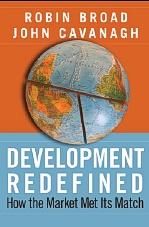 The World Bank should not be in charge of solving the global food crisis.
The World Bank should not be in charge of solving the global food crisis.
This weekend in Washington, the World Bank was making a grab to become the key agency on this issue, entrusted with more power — and more taxpayer funds.
Set up more than 60 years ago to lend money to poorer nations, the World Bank hosted officials from all over the globe at its joint annual meeting with the International Monetary Fund.
But the World Bank’s record should disqualify it from playing a leading role.
For 30 years, we have observed the World Bank at work and have seen firsthand — in rural and urban poor communities from the Philippines to Mexico — why it’s not the answer.
In fact, it is partly to blame for the food price crisis in the first place.
For decades, the World Bank has preached the same gospel of “free markets” that has sunk Wall Street into crisis. It encouraged farmers to stop growing rice, wheat and other crops they can eat, and instead told them to shift to export crops like snow peas, cut flowers, and other products destined for richer consumers in foreign countries.
As a result, governments slashed supports for food crops, forcing many farmers to jump on the export bandwagon. But now, they can’t afford to buy the increasingly expensive imported rice and wheat and corn.
How many of us have walked into the supermarket over the past six months and gasped at the rising prices of everything from milk to the cereal you pour it on? The same thing is happening all over the world, but what appears alarming in this country is devastating across the developing world. As prices rise, millions more are going to bed hungry and angry. In dozens of countries from Haiti to Bangladesh, poor people have taken to the streets in “food riots.” Look at the impact in the Philippines, where many people eat rice three times a day. For decades before the World Bank urged government officials there to focus on export crops like bananas and pineapples, the country grew almost all of the rice that Filipinos ate. Today, the country has the dubious distinction of being the world’s No. 1 rice importer, and rising rice prices have led to more hungry people.
It is time for governments to say no to the World Bank’s request for more money and more power.
And wherever home is, here or in the Philippines, governments and local communities need to say yes to local farmers.
Locally grown food is healthier for every country’s economy. Plus, it tastes a lot better.
But you wouldn’t know that from the World Bank.
Distributed through the Progressive Media Project.